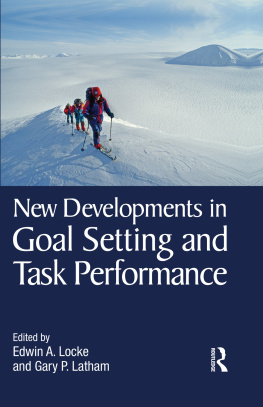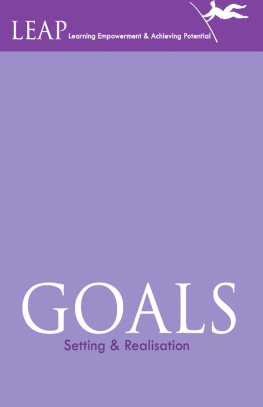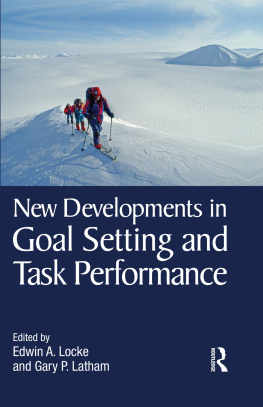New Developments in Goal Setting
and Task Performance
This book concentrates on the last ten years of research in the area of goal setting and performance at work. The editors and contributors believe goals affect action, and this volume will have a lineup of international contributors who look at the recent theories and implications in this area for IO psychologists and human resource management academics and graduate students.
Edwin A. Locke is Deans Professor of Leadership and Motivation (Emeritus) at the R.H. Smith School of Business at the University of Maryland, College Park. He received his BA from Harvard in 1960 and his Ph.D. in Industrial Psychology from Cornell University in 1964.
Gary P. Latham is the Secretary of State Professor of Organizational Effectiveness in the Rotman School of Management at the University of Toronto where he has cross appointments in Industrial Relations, School of Nursing and the Department of Psychology. His previous positions include staff psychologist at the American Pulpwood Association and the Weyerhaeuser Company and Ford Motor Professor in and Chair of the Management and Organization Department of the University of Washington.
New Developments in Goal Setting
and Task Performance
Edited by
Edwin A. Locke and Gary P. Latham
First published 2013
by Routledge part of the Taylor and Francis Group
711 Third Avenue, New York, NY 10017
Simultaneously published in the UK
by Routledge
27 Church Road, Hove, East Sussex BN3 2FA
Routledge is an imprint of the Taylor & Francis Group, an informa business
2013 Psychology Press
All rights reserved. No part of this book may be reprinted or reproduced or utilised in any form or by any electronic, mechanical, or other means, now known or hereafter invented, including photocopying and recording, or in any information storage or retrieval system, without permission in writing from the publishers.
Trademark notice : Product or corporate names may be trademarks or registered trademarks, and are used only for identification and explanation without intent to infringe.
Library of Congress Cataloging in Publication Data
A catalog record for this book has been requested
ISBN: 978-0-415-88548-5 (hbk)
ISBN: 978-0-203-08274-4 (ebk)
Typeset in Minion
by Cenveo Publisher Services
To Cathy and Soosan
Contents
|
|
GARY P. LATHAM AND EDWIN A. LOCKE |
FRANK L. SCHMIDT |
STEVE KERR AND DOUGLAS LEPELLEY
|
PART II
Mediators and Moderators |
MARION B. EBERLY, DONG LIU, TERENCE R. MITCHELL, AND
THOMAS W. LEE |
SUSAN J. ASHFORD AND KATLEEN E. M. DE STOBBELEIR |
HOWARD J. KLEIN, JOSEPH T. COOPER, AND
CHRISTINA A. MONAHAN |
ROBERT E. WOOD, JENNIFER WHELAN, VICTOR SOJO,
AND MOUREEN WONG
|
PART III
Special Goal Topics |
STEFANIE A. PLEMMONS AND HOWARD M. WEISS |
PETER A. HESLIN AND KARYN L. WANG |
ALBERT BANDURA |
DAVID V. DAY AND KERRIE L. UNSWORTH |
SHU HUA SUN AND MICHAEL FRESE |
GERARD H. SEIJTS, GARY P. LATHAM, AND MEREDITH WOODWARK |
PETER A. HESLIN AND DAN V. CAPRAR
|
PART IV
Long-Term and Large Scale Goal Setting Programs and Studies |
ROBERT D. PRITCHARD, BRANDON L. YOUNG, NICK KOENIG,
DANIEL SCHMERLING, AND NATALIE WRIGHT DIXON |
ANN HOWARD |
LISE M. SAARI |
LAURA BORGOGNI AND SILVIA DELLO RUSSO
|
PART V
Goals in Groups and at the Macro Level |
WILLIAM S. KRAMER, AMANDA L. THAYER, AND EDUARDO SALAS |
GREG YOUNG AND KEN G. SMITH
|
PART VI
Goal Setting in Specific Domains |
GARY P. LATHAM AND ALANA S. ARSHOFF |
CHRISTINA E. SHALLEY AND GAMZE KOSEOGLU |
RONALD F. PICCOLO AND CLAUDIA BUENGELER |
KEVIN J. WILLIAMS |
KEVIN TASA, GLEN WHYTE, AND GEOFFREY J. LEONARDELLI |
MICAL K. SHILTS, MARILYN S. TOWNSEND, AND ROD K. DISHMAN |
ROBIN L. WEST, NATALIE C. EBNER, AND ERIN C. HASTINGS |
J. ROBERT BAUM |
PER JOSTEIN MATRE, KITTY DAHL, ROBERT JENSEN, AND
HANS M. NORDAHL |
DOMINIQUE MORISANO
|
PART VII
Cross Cultural Issues in Goal Setting |
MIRIAM EREZ
|
PART VIII
Goals and the Subconscious |
GABRIELE OETTINGEN, MARION WITTCHEN, AND PETER M. GOLLWITZER |
SHLOMIT FRIEDMAN
|
PART IX
Problems and Pitfalls |
GARY P. LATHAM AND EDWIN A. LOCKE
|
PART X
The Goal Setting Questionnaire |
HO KWONG KWAN, CYNTHIA LEE,
PHYLLIS L. WRIGHT, AND CHUN HUI
|
PART XI
Goal Setting and Self Development |
CHERYL J. TRAVERS
|
PART XII
Overview and Conclusions |
EDWIN A. LOCKE AND GARY P. LATHAM
|
Goal setting theory was first presented in our 1990 book, A Theory of Goal Setting and Task Performance. The theory was based on close to 400 studies. Since 1990, over 600 additional studies have been done (Mitchell & Daniels, 2003), and the use of goal setting has expanded into many domains including education, leadership, psychotherapy, health promotion, creativity, bargaining, sports, and entrepreneurship, among others. Furthermore, new discoveries have been made about the core elements of goal setting; for example, mediators, moderators, learning goals, and subconsciously primed goals have been added to the theory. Long-term quantitative data have been reported. Qualitative data have been reported based on the use of goals in large organizations.
The avalanche of new data was too much for two people to handle in a reasonable time span. Thus, we asked authors who had expertise in goal setting to write chapters updating the literature in their area of expertise. Because the authors in turn asked coauthors to write with them, the present book has more than 70 authors and co-authors and 37 chapters (a few done by ourselves or with others). We dont claim to have reviewed all goal setting studies published since 1990; for example, there are many goal experiments in social psychology that are reviewed elsewhere. We focused mainly, though not exclusively, on studies in industrial organizational (I/O) psychology and organizational behavior (OB), although there is some overlap with other fields.
Each chapter was edited by both of us, and some went through as many as four revisions. We thank the authors for their hard work, patience, and cooperation.
We view this volume not as a replacement of our 1990 book, but as a companion piece. The original theory is still sound. But in line with our inductive approach to theory building, we view goal theory as an open theory, leaving it receptive to new discoveries. Science progresses not by going from nothing to omniscience, but by increments, some large and some small. We know more about goals than we once did. Each increment gives us more confidence in predicting, understanding, an influencing behavior through the setting of specific, difficult goals.











